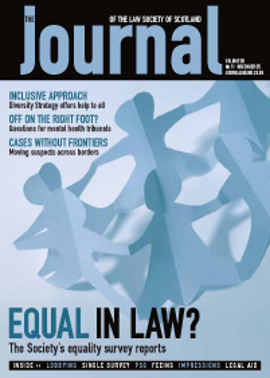Advice for All: the Society's response

The Scottish Executive’s consultation entitled “Advice for All: Publicly Funded Legal Assistance in Scotland – the Way Forward” has recently closed. This is an important document that sets out numerous proposals for the future of legal assistance and can be viewed at www.scotland.gov.uk/Publications/2005/06/16153135/31366. The Society’s Access to Justice Committee carefully considered the document and along with input from the Legal Aid Solicitors Committee submitted its response. The Society’s response should be read alongside the consultation document, but the principal points can be summarised as follows:
Civil legal assistance
The Committee questioned the proposed purely consensual approach to developing better planning and co-ordination of advice services by local authorities without any formal duty on local authorities. The Committee believes that there should be a statutory duty which would prevent inconsistencies in the provision of such services.
The consultation proposes the idea of a national co-ordinating body, which will have the responsibility for the delivery of civil publicly funded legal assistance. The Committee believes that in the medium term there should be a new independent body that would have a role in the development and monitoring of new methods of delivery of civil PFLA, while SLAB’s role should remain funding individual cases and the administration of the legal aid fund.
It is also the Committee’s view that the national co-ordinating body should be able to fund provision by non-legally-qualified providers as well as solicitors and advocates. However, SLAB must retain an ability to assess the competence and comprehensiveness of any alternative source of assistance that might be available.
The Committee is supportive of the proposal to provide more non-remuneration-based methods to encourage civil legal aid provision, but is not convinced that these will address the continued decline in traditional civil legal aid provision unless coupled with more adequate remuneration for carrying out such work.
The Committee agrees with the proposal for the greater use of salaried or employed solicitors for civil PFLA. However, the Committee believes that these solicitors should be employed locally on the basis of need as identified through the partnership working. The Committee sees little merit in a central government agency directly employing solicitors for this purpose, although the central agency might have a role in assisting with recruitment and training and in setting terms and conditions of service.
The Committee agrees with the proposals to collect civil contributions over a longer period of time and make flexible arrangements for the repayment of contributions, including the use of instalments for contributions from capital. In addition, the Committee supports the proposal to introduce a system of extended tapered eligibility, provided it is adequately resourced.
Criminal legal assistance
The Committee firmly believes that reform of criminal PFLA in relation to the prosecution of summary crime should be undertaken only when the exact nature of the Executive’s proposals for the reform of the wider summary criminal justice system is clear in the detail.
The consultation asks whether a national co-ordinating body should also take on responsibility for the planning and co-ordination of the delivery of criminal PFLA.
It is the Committee’s opinion that the proposal for a national co-ordinating body for civil PFLA is based on a perception that there is significant unmet legal need in this area. However, there is no evidence that accused persons encounter difficulties in obtaining the services of a criminal legal aid practitioner. The Committee is unclear as to what role a national co-ordinating body would fulfill in relation to the planning and co-ordination of a service if there is no shortage of supply.
The Committee has reservations about the proposals for a contributory system for criminal legal assistance. Published statistics from the Scottish Legal Aid Board indicate that there will be a very limited number of accused persons who would be subject to payment of a contribution, and the Committee therefore feels that would not justify the additional bureaucracy and subsequent potential for administrative delay.
In response to the question as to whether responsibility for granting criminal legal aid in solemn cases should be transferred to SLAB, the Committee argued that the current system has the advantage of an accused person immediately having publicly funded legal assistance without having to wait while SLAB assesses their entitlement.
Although not directly addressed in the paper, the Committee expressed the view that there is merit in splitting the fund between civil and criminal legal aid. Both should be subject to separate reporting procedures to the Scottish Parliament. This would provider greater clarity in determining exactly where the public funds are being expended and highlight the decline that has taken place in civil legal aid expenditure. Such a step would also help the establishment of the national co-ordinating body on civil PFLA by creating a clear focus for each type of legal aid.
In this issue
- Changing perceptions
- A need undiminished
- Steps forward
- A better way to work
- Combatting the cross-border criminal
- Seen to be fair?
- The lobbying game
- A favoured model?
- A grand day out
- A window of opportunity
- Don't fall at the final hurdle
- Practice guideline: form of accounts and taxation
- Advice for All: the Society's response
- Matter for debate
- Divorcing the divorced
- Uncommon commencement dates
- Scottish Solicitors' Discipline Tribunal
- Website review
- Book reviews
- Still thumbs down
- Search and copy fees changing
- Common currency






